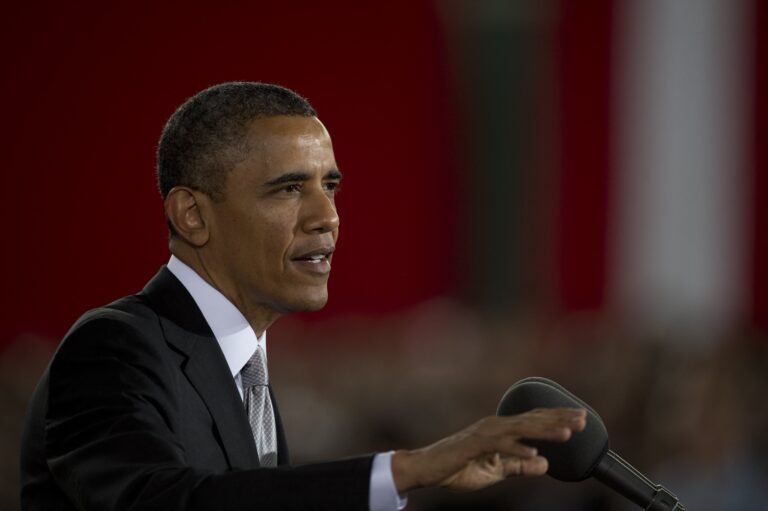
The first thought that comes to our mind when we hear the name Barack Obama would most likely be “the first African American president of the US.”
The second thought would be something along the lines of “bestleadership skills.”
US presidents come and go, but for all he did and all that he is, Obama has won himself a place among the greatest of all time.
Despite being elected during the biggest economic catastrophe since the 1930s, his administration managed to save the country from the brink of a second Great Depression.
In his first term, he signed three signature bills:
- an omnibus bill to stimulate the dying economy
- legislation making healthcare more accessible and affordable (known as Obamacare)
- the Dodd-Frank Wall Street Reform and Consumer Protection Act to help reform the country’s financial institutions.
His achievements, while many, have a few notable standouts.
He made it a priority to provide women with equal rights, such as fair pay and opportunities, especially for women of colour.
He also appointed two female justices to the Supreme Court, opening doors for more female representation in high-ranking positions.
His administration even adopted a climate change agreement signed by 195 nations to reduce greenhouse gas emissions and slow global warming.
And, of course, he legalised same-sex marriage nationwide, a historic decision that would pave the way for LGBTQ+ rights for years to come.
In 2009, he received a Nobel Peace Prize for his efforts in strengthening international diplomacy.
Many assume these are easy for presidents to achieve. As the holder of the highest office, they have teams of highly qualified people to carry out instructions.
But the fact that these achievements only happened under Obama’s watch tells us something more: that these weren’t easy to achieve and it took a special kind of leader to make it possible.
 Obama spoke often about his campaign themes of hope and change, something that resonated with the African American community.
Obama spoke often about his campaign themes of hope and change, something that resonated with the African American community.
Great leadership skills: Natural born talent or something to learn?
A study suggested that leadership is 30% genetic and 70% learned. It concluded that leaders are not born but made. For example, a person can be born with a predisposition for extroversion, a quick brain and natural charisma. However, you still need to be “ready, willing, and able” to pair your innate talents with lessons learned through life experience.
“Students first become ready to learn about being a leader; then they become willing to learn the skills necessary to practice leadership; and finally they’re able to lead because they have the skills and the motivation to do it,” said Kari Keating, who teachers leadership courses at the University of Illinois.
What do these skills and motivation look like? That depends on how you construe leadership.
 Even in the animal kingdom, animals like wolves operate in packs led by a leader.
Even in the animal kingdom, animals like wolves operate in packs led by a leader.
What is leadership?
In the 1960s, the dominant understanding of leadership came from W.C.H. Prentice: “the accomplishment of a goal through the direction of human assistants.”
The former president of Wheaton College and author of the seminal paper on this subject described a successful leader as one who can understand people’s motivations and enlist employee participation in a way that marries individual needs and interests with the group’s purpose.
In this traditional view, organisational structure and processes are key.
More contemporary researchers have argued that there are more elements to it, such as inspiration, vision, and human passion.
Then there are the countless examples throughout history to consider as well, from India’s founding father Mahatma Gandhi to Yugoslavian revolutionary Josip Broz Tito.
But we need not look at the highest offices of nations to find examples of great leadership qualities.
Just look at our parents, schools and immediate community and we’re just as likely to know someone we immediately associate as a “leader.”
In fact, Keating defines leadership as “an individual influencing a group of people toward a common goal.”
“You can lead through your interactions, your relationships, your communication, the way you express thanks, your ethics,” he said.
Who better to make a case study of these than Obama, the most notable recent leader of the most powerful nation in the world today?
 Many are impressed with Obama’s public speaking abilities.
Many are impressed with Obama’s public speaking abilities.
8 best leadership skills everyone can learn from Barack Obama
Crisis management
Obama’s presidential appointment was thought by many to be doomed for failure, thanks to the economic crisis that threatened to send the country into the ground.
One of the first things he did upon his appointment was to sign the American Recovery and Reinvestment Act, a US$831 billion recovery package.
More than a decade of growth and job creation – the longest in American history – followed.
Speaking about Obama’s first 100 days in office, Los Angeles-based crisis management consultant, Jonathan Bernstein says to CNBC: “One thing he excels at is setting realistic expectations with his audiences.”
“He’s been careful not to over promise.”
Love thy enemy
Obama had many adversaries, but rather than seeing them as enemies, he saw them as rivals to be charmed.
The most obvious reason for this was his heritage. Being Black put him at risk of being seen as combative and aggressive as compared to his white counterparts.
But Obama was naturally a charismatic man, and he excelled at handling his opponents.
A famous example would be his relationship with Hillary Clinton, wife of former president Bill Clinton.
They were bitter rivals in 2008, going up against each other for the presidential campaign. In fact, Obama barely found Clinton “likeable enough.”
But when he was elected, one of his first moves was to appoint her as his secretary of state.
“Love your neighbour as yourself,” said Obama, quoting the Bible. “See in those with whom you disagree most vehemently the face of God. For we are all his children.”
 Fun fact – Obama has given almost 500 speeches.
Fun fact – Obama has given almost 500 speeches.
Great communicator
Obama has been frequently praised as one of the greatest orators and writers of our time.
Known for his low-pitched, slow-paced vocal style full of impactful pauses, he commands his listeners well with an assertive way of speaking.
While speaking, he also maintains good eye contact, which most people struggle with. Rather than unconsciously scanning the room or glancing momentarily at others, he directs his eyes to various sections within the space and stays there for a while.
Announcing Senator Joe Biden as our VP nominee. Watch the first Obama-Biden rally live at 3pm ET on http://BarackObama.com
— Barack Obama (@BarackObama) August 23, 2008
Being ahead of his time
Obama took office around the time the iPhone just launched. With it came the introduction of mainstream social media platforms, made easy to use with the iPhone’s interface, camera and constant connectivity.
Soon, everyone has a Facebook, Twitter, Instagram, and Snapchat account.
Obama embraced these new tools. He took the opportunity to announce his vice presidential pick – Joe Biden – on Twitter, which was at that time still a newly hatched social media platform.
He then went on to become the first president to tweet from @POTUS, to go live on Facebook, to use a filter on Snapchat — becoming the “first social-media president.”
Time management
Obama is famous for his efficient time management skills. He prioritises an early start to his day, getting right to work in the morning despite often going to bed late.
His secret? A great routine, and a pre-planned schedule. But how did he know what to prioritise?
According to Mike Cannon-Brookes, co-CEO of $100 billion software company Atlassian, who reportedly asked Obama about this, it’s all about cateogrising his taks into four priority levels.
Called “the four Ps,” they are:
- P1s: These are the most important issues he was working on at a given time.
- P2s: Less pressing than P1s but still required Obama to have the final say.
- P3s: Obama needed to know and to give advice on these, but it’s his chief of staff or cabinet members who handled them.
- P4s: Obama only needs to know of the progress and give input at times.
 Before his presidency, Obama and his family were faithful attendees of Trinity United Church of Christ.
Before his presidency, Obama and his family were faithful attendees of Trinity United Church of Christ.
Humility
When Obama was first sworn in, he spoke of “humble gratitude,” the “spirit of service” and “a willingness to find meaning in something greater” than ourselves.
As a leader, he never spoke about himself or made a show of his own ego. He stood alongside his people, rather than lording over them. He never abused his power, and sought to emphasise humility as a virtue and diplomatic tool.
“Let me suggest that those of us with the most power and influence need to be the most humble,” said Obama during a National Prayer Breakfast.
Here’s an interesting read—a reminder that behind every opinion lies a human being with real experiences and a story to tell. Sometimes we’ll agree and sometimes we won’t, but if we want our democracy work, listening to each other isn’t optional. https://t.co/8d4fPUprlu
— Barack Obama (@BarackObama) October 9, 2019
Good listening skills
During a commencement ceremony at the University of Michigan, Obama encouraged graduates to listen to people unlike them.
“If you’re somebody who only reads the editorial page of The New York Times, try glancing at the page of The Wall Street Journal once in a while. If you’re a fan of Glenn Beck or Rush Limbaugh, try reading a few columns on The Huffington Post website. It may make your blood boil, your mind may not be changed. But the practice of listening to opposing views is essential for effective citizenship. It is essential for our democracy,” he said.
When faced with an issue, Obama approached it carefully with openness, intellect, and confidence in his people.
He was always quick to resolve issues, but oftentimes he would listen to others’ advice before proceeding with his decisions.







